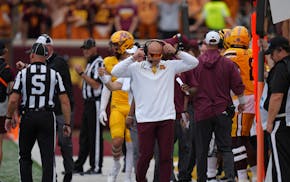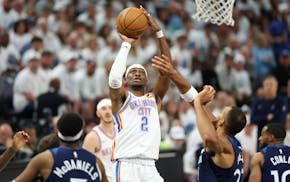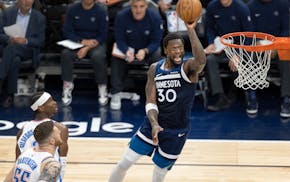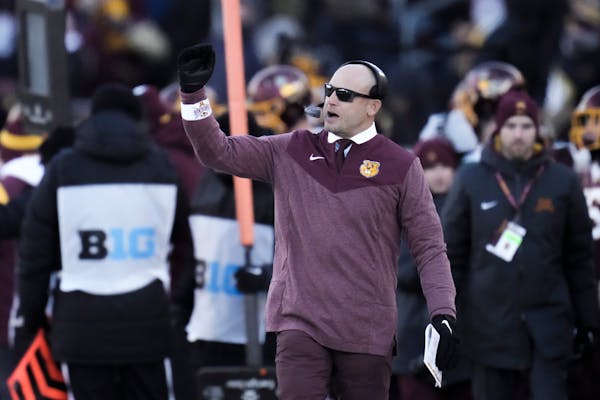This could have been so easy. Uncle Pat, as he's known to a variety of media acquaintances, other friends and actual nieces and nephews, could have responded with a shrug when the Gophers sent out a release on Wednesday that football coach P.J. Fleck had received another raise and another year on his contract.
The old-timer could have stuck to this declaration made two days before the trip to Michigan State for the Big Ten opener in late September:
There would have been no need to mention the Big Ten West this fall had gone from overmatched to trespassers in this conference and still, Fleck managed a mere 3-3 division record.
The 34-7 victory over Michigan State had been a strong indicator the Gophers had the best personnel in the West, and then when evidence surfaced quickly that Wisconsin was in serious decline, Iowa was remarkably punch-less, and Nebraska had reached rock bottom, all the boat rowers knew a berth in the Big Ten title game was there for Fleck's squad like a 12-pound walleye caught on the Mississippi River.
Throw in the fact the crossover schedule did not include Michigan or Ohio State, and what Fleck was looking at was the easiest conference schedule since World War II, following a three-game nonconference cakewalk — yes, it was a season of failed expectations, but there were costlier problems elsewhere.
Nebraska paid a $17 million buyout to fire Scott Frost early in the season. Then, Wisconsin negotiated an $11 million buyout to fire Paul Chryst at midseason.
Thus, it would've been easy to state that the fan base — aka Gophers Neighborhood — should embrace the stability that Fleck brings, even if Chryst was fired with a 43-18 (.705) record in the Big Ten, and P.J. carries a 26-26 (.500) conference record into this extended contract.
Nebraska went eight years for over $8 million per for Matt Rhule, and Wisconsin went seven years starting at $7.5 million for Luke Fickell.
So, let the Fleckster go tell athletic director Mark Coyle that he needs a raise, and Coyle pushes him up another million to $6 extra-large, and on we go, ready for the Gophers to sign on Dec. 21 one of the top 50 recruiting classes in the nation (which wasn't the case for 2022).
Live and let live, Uncle Pat said. And then he read the Gophers' official release extolling the prudence of this new deal, and Fleck could not resist offering this granddaddy of self-aggrandizement:
"During the last six years, we have been able to do some amazing things at Minnesota, some of which have not been accomplished in 115 years.''
And there was the forearm to the cranium of Uncle Pat, who was witness to his first Gophers game at age 9 in 1954, when Bob McNamara returned the kick against Iowa, and most of the 65,000 in attendance went joyously insane.
There was this moderately successful Gophers coach, the first to inherit a winning team (9-4 in 2016) since Bernie Bierman came back from the Big War in 1945, trying to sell the idea he has provided gridiron amazement not achieved in 115 years … which means 1907.
Perhaps Fleck was referring to the notable 11-2 season in 2019, a victory total that hadn't been reached since Henry Williams went 13-0 in 1904. Included were victories over Central High School, Shattuck, Carleton and St. Thomas, two of which could have replaced Western Illinois on this season's schedule without much of a drop-off.
On Fleck's amazement meter, winning 11 of 13 games apparently beats those pairs of back-to-back 8-0 seasons in 1934-35 and 1940-41 and national championships for the Bierman Boys.
The issue with mixing history and the era of 12- and 13-game schedules is this:
The Gophers played schedules of eight games or fewer from 1906 through 1941, nine-game regular seasons from 1942 to 1964, and 10-game schedules from 1965 to 1970.
Tough to get to 11.
Maybe what's causing P.J. to float his own boat is that a victory over so-so Syracuse in Yankee Stadium on Dec. 29 would give him four straight bowl wins. In Fleck-land, we should appreciate those more than reaching back-to-back Rose Bowls (1-1) after the 1960 and 1961 seasons.
And we should overlook the fact the Big Ten did not start sending teams to bowl games until the 1946 season, and then it was only to the Rose Bowl through 1974. Now there are 40-some of those things, and it's statistically much harder for a Power Five conference team to miss a bowl game than to play in one.
P.J. Fleck can claim amazing Gophers football accomplishments unequaled in more than a century.
Uncle Pat remembers Bob McNamara (and Bobby Bell) and does not abide.

Reusse: Jim Marshall belonged to us, and Minnesota loved him for it

Reusse: Murphy's return will be a fun time on the ice

Reusse: Gophers vs. Huskers and an 80th birthday on a fall Friday? Good day to be a homer again

Reusse: Bring on boos, but Gilgeous-Alexander is a deserving MVP


